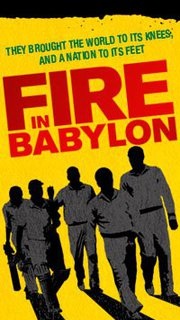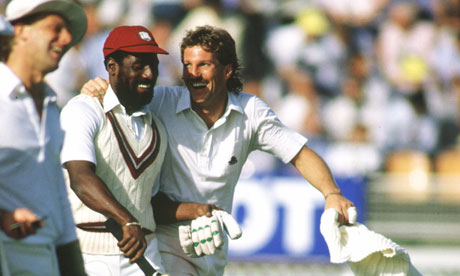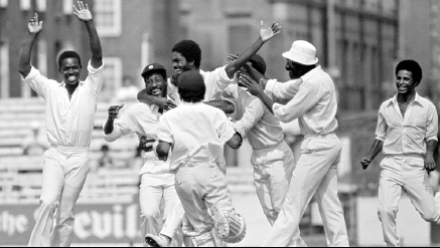 Fire in Babylon
recounts the transformation of the West Indies cricket team from "Calypso
cricketers" to the most successful and feared outfit on the planet. The "Windies'"
rise to invincibility, which began in the mid-1970s, was led by a fearsome
foursome of fast bowlers, many of whom featured prominently in this 82-minute
documentary.
Fire in Babylon
recounts the transformation of the West Indies cricket team from "Calypso
cricketers" to the most successful and feared outfit on the planet. The "Windies'"
rise to invincibility, which began in the mid-1970s, was led by a fearsome
foursome of fast bowlers, many of whom featured prominently in this 82-minute
documentary.
Fire in Babylon, though, is much more than a mere documentary about cricket. As the film so eloquently explains, the West Indies cricket team's ascent up the world ranks occurred within a context of emerging black liberation and black pride throughout the Caribbean region. Thus, it was a desire to defeat their former colonial masters that fueled the West Indies players of the 1970s and '80s to reach heights not seen before or since.
The film also touches on the unseemly side of West Indies
cricket, such as the defection of top players to participate in Kerry Packer's
World Series Cricket in Australia in the late '70s and those players'
subsequent ban from the official West Indies team.
As Babylon points out, though the West Indies Cricket Board of Control (as it was aptly named then) frowned on the players' participation in what was seen as a sideshow, the fitness and professionalism demanded of the West Indians down under was instrumental in their later domination of the cricketing world -- once they were fully restored to the official Windies side, of course.
Babylon also doesn't sugarcoat what is arguably the
biggest blight on West Indies cricket -- the participation of several black
West Indians in "rebel tours" in South Africa in the early 1980s.
 The former Test-playing country of South Africa had for
years been banned from sporting competition because of its apartheid
government, but it paid top dollar for talented players to defy their
respective governments and cricketing boards to entertain cricket-starved South
African audiences.
The former Test-playing country of South Africa had for
years been banned from sporting competition because of its apartheid
government, but it paid top dollar for talented players to defy their
respective governments and cricketing boards to entertain cricket-starved South
African audiences.
As former West Indies captain Viv Richards reveals in Fire, South African officials offered him a blank check for his services, but he couldn't stomach the thought of being an "honorary white" in a country that had oppressed his fellow black people for decades. Cue to the images of shamed West Indian rebels walking the streets of the Caribbean as vagrants, banned by their boards and ostracized by their people, while Richards is hailed as the embodiment of black African regality.
Fire in Babylon screened June 27 during the annual Silverdocs festival in Silver Spring, Md.,
and I got to enjoy it in the friendly confines of the AFI Silver Theatre,
which boasts the most comfortable seats of any cinema I've ever been in
anywhere. In this cinema, the quality of the film is almost secondary, but
fortunately for those gathered, Babylon was riveting viewing from
beginning to end.
The interviews with former players were insightful, the music brilliantly interspersed, the sociological insights from University of the West Indies Professor Hilary Beckles were spot-on, and the rare archival footage of cricket matches from yesteryear was a genuine treat for a sports geek such as myself.

Flanked by a New Yorker and a Ukrainian, classmates of mine
at American University, I even got to explain the finer points of the game of
cricket while we watched. My colleagues were surprised at the seeming violence
of the game -- what with bowlers aiming the hard, red ball at batsmen's heads
-- and I must admit the action was at times intense even for someone like me
who's seen lots of cricket, in person and on TV, over the years.
I once heard a professor at UWI's campus in Jamaica say that every Caribbean person should be required to read C.L.R. James' Beyond a Boundary, an iconic 1963 book about cricket and society. I still haven't fufilled her mandate, but I feel I've more than made up for that omission by watching Fire in Babylon. I dare say it's required viewing for Caribbean people and cricket fans everywhere.




